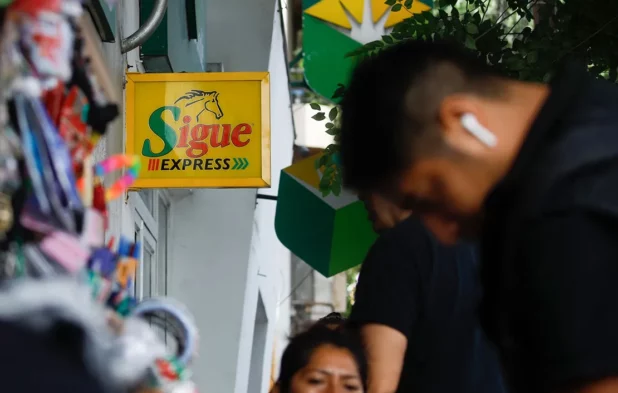No one could have predicted something like this.
That’s why it’s so shocking.
A Mexican mother walked into a bank in her home city of Culiacán in the Mexican state of Sinaloa, where an $8,000 remittance from the United States was waiting. She withdrew the funds in local currency, then strolled across town and deposited nearly all of it into accounts at two different banks.
Money sent home by migrant workers is a lifeline for millions of Mexicans. But the woman had never met the person who wired her the funds, nor the owners of the accounts where she took the cash. What she did know: The deal had been carefully arranged by the Sinaloa Cartel, one of the world’s largest drug trafficking groups, to repatriate profits from U.S. drug sales back to Mexico disguised as a routine remittance.
Her cut: $230 worth of Mexican pesos.
It was the start of easy money for the woman, who said she previously had struggled to make ends meet cleaning houses. Recalling that day in April 2014 for Reuters, she estimated she had earned some $17,000 over the years recruiting others into the scheme and cashing remittances totaling hundreds of thousands of dollars – but never too much or too often, so as to avoid scrutiny by banking authorities. She said a neighbor got her into the game, and that she had never met her bosses in person.
“Everything was by phone,” she said, “and the phone numbers changed every time.”
The woman showed Reuters WhatsApp messages on her phone that she said were from traffickers coordinating her remittance pickups and drop-offs. One from early 2022 said: “They are waiting for you outside. They know who you are. Give them the money.”
The Culiacán mother is part of an army of civilians recruited by the Sinaloa Cartel and other drug syndicates across Mexico to help move illicit drug profits earned in the United States south of the border. The criminal scheme essentially piggybacks on the vast legal network of money-transfer firms that help migrant laborers send money home to their families.
Remittances to Mexico, nearly all of which come from the United States, hit a record $58.5 billion last year, according to data from Mexico’s central bank. That’s an increase of $25 billion, or 74%, compared to 2018, when President Andrés Manuel López Obrador came to power. Mexico’s economy has been slow to recover from the coronavirus pandemic, a factor that has boosted migration to the United States in recent years along with the remittances that workers send home.
As legitimate remittances have ballooned, it has become ever easier for cartels to disguise their ill-gotten gains in small transfers sent to average people across Mexico who have no obvious links to organized crime, according to four U.S. and Mexican security officials.
The cartels are awash in cash from U.S. sales of fentanyl, cocaine, heroin, methamphetamines and marijuana. Presently, up to 10% of all Mexico-bound remittances may be drug money moved by criminal organizations like the Sinaloa Cartel and the Jalisco New Generation Cartel, according to a U.S. government official who works on illicit finance and asked for anonymity because he is not authorized to speak publicly on the subject. A March report by the Mexico think tank Signos Vitales estimated that at least $4.4 billion, or 7.5%, of remittances sent to Mexico last year could come from illegal activity.
Several features of the remittance sector make it an attractive vehicle through which criminal funds can enter the financial system, according to four industry executives and the Mexican and U.S. law enforcement officials. Chief among them is the worldwide reach of this network and the modest-sized cash transactions that drive it. Identification requirements for such transfers are more relaxed than those needed to set up a formal bank account or to wire significant sums of money.
Cases of crime groups using popular money-transfer services to conduct illegal activities have been documented before. Reuters reported previously on how gangs operating on both sides of the U.S.-Mexico border have kidnapped migrant workers and held them for ransom, demanding that relatives wire remittances to free them.
Now the news agency is the first to detail how Mexican drug gangs have harnessed legitimate remittance networks to repatriate their U.S. drug profits, and the factors that make this activity so difficult for authorities to detect and thwart.
#Criminalmigrants flooding into the US as a feckless CBP under the Biden regime does nothing. These aren’t even South Americans; these are Africans and others traveling 1000s of miles by plane to jump the border. These people bring ZERO benefit for our Nations. pic.twitter.com/4RnLMApeZx
— Anti White Watch ☀️ (@AntiWhiteWatch1) August 18, 2023
Reuters interviewed two dozen Mexico residents who said they had been paid by the Sinaloa Cartel to act as conduits for remittances, turning the money over to cartel operatives after receiving it. Records from eight U.S. federal court cases and interviews with a dozen industry insiders, analysts and law enforcement agents on both sides of the border paint a detailed picture of how the criminal venture works.
Seven money-transfer firms and banks that responded to Reuters’ queries said they are constantly working to thwart criminals. Colorado-based Western Union, the world’s largest money-transfer operator, said in a statement that it devotes “significant resources to help detect and deter the misuse of our services.”
Jorge Godínez, Americas director for WorldRemit, a London-based money-transfer service, was skeptical that crooks would turn to remittances to move vast sums of money in bite-sized chunks. “They would need to do a lot of transactions,” Godínez said. “I don’t rule it out, but it’s a little more work.”
But drug syndicates appear to be doing just that, due in part to the coronavirus.
The use of remittances to move drug money was supercharged by the COVID-19 pandemic after long-established travel routes were upended by closures and lockdowns, according to four security officials from the United States and Mexico. Between March 2020 and November 2021, the U.S.-Mexico border was closed to all but “essential” travel. That made the traditional method of repatriating drug profits – bulk smuggling of cash hidden in southbound cars, trucks and cargo trailers – much harder. Traffickers turned to other means, the security sources said, resulting in a heavier reliance on remittances. It’s an approach that has endured even as the public health emergency has receded, they said, because the networks the narcos established are effective.
In a sign of growing concern within the U.S. government, the office of the Director of National Intelligence, the principal provider of intelligence to the president, included for the first time this year in its annual threat assessment report the “exploitation of legitimate remittances channels” by transnational crime organizations to launder money. The report did not single out any money-transfer companies.
The use of such transfers by narcos is not a new phenomenon, but the huge increase in remittances from the United States to Mexico in recent years “helps obfuscate this practice,” according to a person familiar with the report. The Sinaloa Cartel and Jalisco New Generation Cartel are believed to be among the drug syndicates using remittances to repatriate drug proceeds, the person said.
𝗜𝗺𝗮𝗴𝗲𝘀 𝗳𝗿𝗼𝗺 𝘁𝗵𝗲 𝗕𝗼𝗿𝗱𝗲𝗿: As illegal border crossings surge, criminal activity such as illegal immigrants who evade capture by traversing on private ranches, attempts to scale the border wall w/ ladders, to human smuggling, remains evident throughout the southern… pic.twitter.com/b1w6fGVKaU
— Chris Olivarez (@LtChrisOlivarez) August 17, 2023
There is a clear pattern for how money is laundered via remittances, according to the U.S. official who works on illicit finance, people who have participated in the scheme in Mexico, and federal court documents reviewed by Reuters from U.S. money laundering prosecutions.
In the United States, much of the remittance trade is conducted through corner stores, chain retailers and currency exchanges. These businesses sign on as agents with one or more of the money-transfer companies, for example Western Union, and display the familiar logos of these firms in their shops to entice customers. The retailers receive training from the money-transfer companies on how to use their technology platforms, spot fishy transactions and comply with U.S. anti-money laundering laws. Agents are paid a commission for each transaction they process. Customers can bring cash to these storefronts and send it abroad. Neither senders nor receivers are required to have a bank account.
This fragmented network is key to the functioning of the scheme, according to the people and documents. Although money-transfer companies have internal systems designed to spot and curtail illegal activity, controls largely rely on checks done face-to-face with customers at the shop level. Thus, protections are only as robust as the honesty and diligence of these mom-and-pop agents, some of whom are purportedly in league with drug traffickers, according to law enforcement sources and the eight federal court cases reviewed by Reuters that involved alleged laundering of drug money via money transfers.
They’re just looking for a better life.
 Daily Stormer The Most Censored Publication in History
Daily Stormer The Most Censored Publication in History





